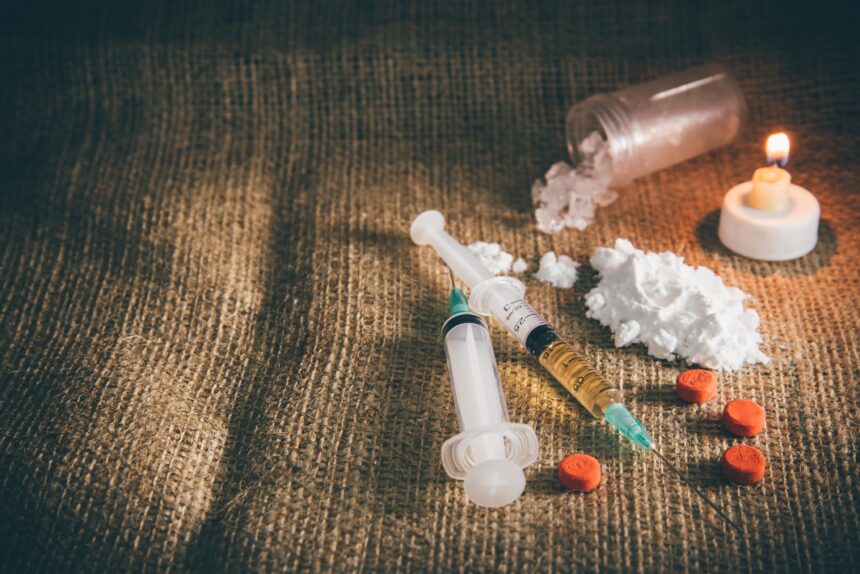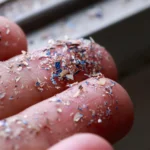Nyaope and other hard drug users call it “spiking” – the injection of unregulated hard drugs into the body via syringes. Enter harm reduction services.
One of the organisations that provides addicts with harm reducing services is the Networking HIV and Aids Community of Southern Africa, Nacosa. Nacosa provides a wide range of harm reducing services such as providing sterile needles and syringes to drug addicts, usually, nyaope and heroin users.
While figures clearly show that the adoption of harm reduction services is very important, it has also run into strong resistance. One of the main arguments against harm reducing services is that they encourage addiction.
Outlining some of the reasons for supplying addicts with syringes and other harm reduction services, Nacosa programme manager: key populations and human rights Yolaan Andrews said that “the most commonly injected drug in South Africa is heroin. Other drugs can also be injected, including crystal meth (tik) and crack cocaine.
“People almost always start by smoking heroin, but tolerance in their body builds up and they end up not being able to afford to smoke it any more, so they transition to injecting.”
Andrews said that “hepatitis C prevalence among people who inject drugs is 83%, with 21.8% HIV prevalence. The best way to reduce the risk of acquiring and transmitting disease through injection drug use is to stop injecting drugs,” said Andrews.
“In Tshwane, we already have 97% hepatitis C among injecting drug users and the number will keep increasing,” Executive Director at Harm Reduction International Shaun Shelly said.
Minister of Health Aaron Motsoaledi. (Photo: Gallo Images / Frennie Shivambu)
According to Health Minister Aaron Motsoaledi, 7.8 million people are infected with HIV in South Africa.
Despite this, there has been resistance to providing harm reduction services, with the main argument being that it encourages addiction. The criticism comes from some addicts’ families, some in government, and other organisations.
Threats
“This programme has been threatened and actually suspended in several districts by ward councillors, even though this is a national programme that is endorsed by the Department of Health at a national, provincial and district MOU level,” Andrews said.
“Recently all health services including needles and syringes were suspended in Wynberg, Cape Town from November 2023 to February 2024 by the ward councillors. Following community backlash in Wynberg over needle services, municipal officials requested that the mobile clinic be suspended in that area,” Andrews said.
“In Wynberg, the shutdown lasted four months before Western Cape Premier Alan Winde intervened. He informed local officials that sterile needle programmes are an explicit part of the provincial strategy for reducing HIV transmission, and need to be supported,” Andrews said.
In 2018, Andrews said, the eThekwini municipality also closed Nacosa’s TB and HIV Care programme for two years despite agreements that the organisation had with the Kwazulu-Natal government. The programme was reinstated after two years after an agreement was reached.
“A legal opinion recently provided has confirmed that no person (including members of the public) is legally justified to bar people who use drugs from accessing the needle and syringe programme,” said Andrews.
The belief that the programme encourages the use of drugs and of addiction is legally flawed: “The needle and syringe programme clients’ constitutional rights as enunciated in sections 9, 10, 12 and 27 of the Constitution supersedes these ill-informed beliefs,” Andrews said.
Shelly said that “the provision of sterile needles and syringes to people who are already injecting drugs does nothing to promote addiction or drug use at all”.
Nkosikhona Hadebe, a nyaope addict who has been injecting himself for the past four years, said, “All those who want to stop this programme are simply jealous of the work that Nacosa is doing because they know that while we failed ourselves, they also failed us.”
Nyaope addict Bennet Hlongwani said, “Government will just force you into rehab even though it’s clear that rehab is not working. It will never work. In rehab we are not allowed to smoke cigarettes, it’s like a prison. How is depriving us of what we already smoke corrective or helpful?”
Hlongwani said he was on a collision course with his mother who was against the supply of sterile needles and syringes.
Costs
Nacosa says funding for its harm reduction supplies and other support is provided by the Global Fund, which also supports the procurement of sterile needles and syringes.
“Nacosa places a national tender and procures through the successful bidder,” Andrews said. At the moment, one harm reduction pack that contains sterile syringes and needles costs R36, and an average of six packs are used per person per month.
The Department of Health does not supply any sterile needles and syringes or commodities needed within the harm reduction packs.
“The provision in this country is dependent on external funding,” said Andrews.
Apart from the supplies, sterile needles and syringes, Nacosa also provides sensitisation workshops to SAPS, local law enforcement, community leaders and clinics to minimise the stigma and harassment or suspension of services to people who use drugs.
The organisation also provides safe smoking packs for those who smoke heroin to prevent TB, Covid and hepatitis infections through saliva, and to minimise lip burns and lung damage from using inappropriate devices.
Additionally, they also provide ID application support and hygiene packs, sanitary packs, child care packs and food packs as 85% of the people they serve are unhoused. “We are also piloting overdose management kits for stimulant and opiate overdoses,” said Andrews.
“The National Drug Master Plan and National Strategic Plan for TB, HIV and STIs strongly call for these services, but (there is) no implementation commitment from the government,” said Andrews.
Harm reduction services
Dr Andrew Scheibe, technical adviser at TB/HIV Care and a researcher at the University of Pretoria’s Department of Family Medicine, said, “The harm reduction services we provide are effective in keeping people alive, preventing transmission of HIV and hepatitis, preventing skin diseases/infections/abscesses and potential amputations, reversing overdoses, improving quality of life and connecting people to broader health services.”
Andrews said, “We have successfully prevented sharing of needles as we can see in the comparative data where we went from 14% HIV positivity in October – December 2023, to 5% in April – June 2024.”
Shelly said that “people who refuse to implement harm reduction around the world have huge increases in HIV, and these days in particular, also hepatitis C.”
Andrews emphasised that “they are not using our services to get high, they are using them to stop the painful withdrawals. This programme is a harm reduction programme that focuses on minimising risk to others and preventing HIV and hepatitis. Needles do not encourage drug use because they already use anyway, they will inject anyway, but now they are taught by our programme to inject safely and it prevents them from contracting disease and spreading it to others.”
Additional support
According to Nacosa, the supplies are distributed weekly as people who inject tend to do so four times a day.
“This service is provided alongside other services such as ART/TB/STI/PrEP treatment, psychosocial counselling and peer education, human rights violation reporting and referrals, so that is why they are seen weekly,” said Andrews.
“Harm reduction services are a good alternative to the unregulated drugs addicts use. They keep them alive, reduce medical costs and reduce the burden on the medical system,” Shelly said.
“It’s a cheap intervention compared to treating one for HIV or hepatitis, or having to look after them when they have other diseases as well. It makes financial sense, but also compassionate sense because it engages with people to find safe alternatives for coping.”
When asked if the existing rehabilitation programmes were effective, Scheibe said rehabilitation programmes that involved in-patient rehab were generally ineffective and were not recommended practice.
“We need more community-based services, that include relevant treatment and harm reduction services.”
Dr Scheibe said: “People do not need ‘reforming’ – it is often the context and environments that need reforming, to support people and not punish them. People need to have access to effective health and social services.”
Email Us on editorial@nnafrica.com













